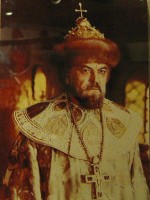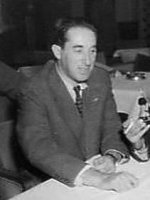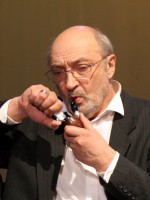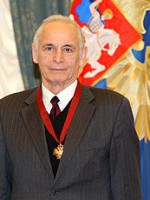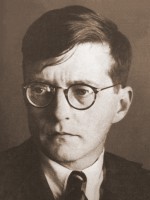Anastasia Vertinskaïa is a Actor Russe born on 19 december 1944 at Moscow (Russie)

Anastasiya Alexandrovna Vertinskaya (Russian: Анастаси́я Алекса́ндровна Верти́нская) (born December 19, 1944, Moscow, Soviet Union), is a Soviet and Russian actress whose mass popularity and high critical acclaim made her one of the most distinguished figures in the history of the Soviet cinema. In the 1990s, disillusioned with the state of cinema at home, she went abroad to teach and spent 12 years in France, England, the United States and Switzerland. In 1988 Vertinskaya was designated a People's Artist of Russia; she is also a recipient of the Order of Honour (2005) and the Order of Friendship (2010).
Vertinsky never scolded his daughters for failures, of which there were many because, as Anastasiya later remembered, she was more concerned at the time with exploring her dad's vast library than with her school studies. Alexander developed his own way of dealing with his daughters's problems. "He used to say: 'Now, the news of your misbehaviour make me suffer enormously' and I tried my best to somehow harness this nasty temper of mine – if only to relieve him from those sufferings," Vertinskaya remembered decades later.
Career
Initially Anastasiya Vertinskaya was thinking of a career in linguistics, but things changed overnight in 1961 when the then sixteen-year-old was approached personally by the film director Aleksandr Ptushko for the role of Assol in Scarlet Sails. The romantic teenage drama based on Alexander Grin's novel became an instant success, making Anastasiya a national celebrity. Many of the future stars of Soviet cinema, including Vasily Lanovoy, Ivan Pereverzev, Sergey Martinson, and Oleg Anofriev, were in the cast, but, as critics noted, it was Vertinskaya's passionate performance that gave Scarlet Sails its flavour. 23 million people viewed the film during its first year.
In 1962 Vertinskaya starred in the Amphibian Man, Gennady Kazansky and Vladimir Chebotarev's adaptation of Alexander Belyayev's book of the same title. Cast as Gutierrez, a young woman in love with an amphibian man, Vertinskaya had to go through difficult late Autumn underwater shooting sessions which she performed all by herself, without any stuntwomen involved. The film became the Soviet 1962 box-office blockbuster. "Vertinskaya was now a brand. People were going to the cinema to watch her, specifically," her future husband Nikita Mikhalkov later recalled. All this changed the teenage actress's life dramatically, not necessarily for the better. "In those days there weren't any bodyguards. I used to travel by tram to my studies. I had to queue for bread like everyone else. Not only was I recognized, they made a point of touching me too... It was in those days that I developed a fear of crowds... This immense psychic violence, it haunted me all through those years," she later remembered.
In 1962 Vertinskaya joined the Moscow Moscow Pushkin Theater troupe. This meant that from then on she had to continuously tour the country with the then popular so-called "theater brigades". In 1963, assisted by Lyudmila Maksakova, her elder sister Marianna's friend, Vertinskaya enrolled into the Shchukin Theatre Institute. The young actress's eagerness to act was, in her own words, "next to maniacal." Nikita Mikhalkov was one of her fellow students. They fell in love and married in 1966, only to be divorced three years later.
The role of Ophelia in the 1964 Grigori Kozintsev's film Hamlet (starring Innokentiy Smoktunovsky) made Vertinskaya known internationally and proved to be a turning point in her career. As Kozintsev later wrote, Vertinskaya's strength was her "fragile purity and this Renaissance look she had." It was this experience that became Vertinskaya's creative milestone, something she had to look up to and prove herself against. Working next to masters like Smoktunovsky proved to be invaluable in terms of learning, introducing the young actress to many of what she called "this magic kitchen's secrets." "Ophelia made me realize for the first time that acting was indeed my destiny," she later said.
While still at the Shchukin Theatrical School, Vertinskaya played the role of petite Princess Bolkonsky in Sergey Bondarchuk's epic adaptation of Leo Tolstoy's War and Peace (1966–1967). It was her sensual, touchingly naive portrayal that gave this character a new, humane dimension. This was the director's idea. Sergey Bondarchuk suggested a new, [more] tragic interpretation of this character. She's neither clever nor in any way interesting. Nice, pleasant, home-bound... Had she stayed alive, we wouldn't have loved her. What could she amount to, next to Prince Andrey, her husband? And yet it was her death that prompted him to tempt fate with the question: "Why did this human being have to die, and what for?" What I think Tolstoy tried to warn us against was the tragic mistake we make when we neglect the love of someone who is close to us... A. Vertinskaya
Vertinskaya said it was War and Peace that taught her how to "create a deep tragic undercurrent in something that on the face of it bears no sign of tragedy whatsoever." Less famous but still highly respectable was her performance as Kittie Shcherbatskaya in Aleksandr Zarkhi's 1968 adaptation of Anna Karenina. Among other late 1960s Vertinskaya's films were Hold Your Head Up! (Ne goryui!, by Georgy Daneliya), The Polunin's Case (Slutchay s Poluninym, adapted from Konstantin Simonov's book, and The Preliminary Man (Prezhdevremennyi tchelovek), Abram Room's adaptation of Maxim Gorky's unfinished novel Yakov Bogomolov.
Vertinskaya in theatre
In 1967 Vertinskaya joined the Vakhtangov Theatre troupe and spent there one season, before moving to Sovremennik Theatre in 1968, where she stayed until 1980. Theatrical experience was, admittedly, of the utmost importance to an actress who never felt confident enough while acting in movies. "I was a slow developer," she admitted years later. In Sovremennik she starred as Olivia (Twelfth Night), Ranevskaya (The Cherry Orchard) and Valentina (Mikhail Roshchin's Valentin and Valentina).
In 1980 Vertinskaya left Sovremennik for the Moscow Art Theater. "It was only here that I acquired the level of professionalism I was craving for," she said in an interview years later. At MAT Vertinskaya mastered two roles from Anton Chekhov's repertoire, traditionally regarded as difficult: Nina Zarechnaya (The Seagull) and Yelena Andreyevna (Uncle Vanya). Critics praised Vertinskaya's performances – "emotionally charged, yet perfectly controlled." Among her other triumphs of the time were Elmire in Molière's Tartuffe directed by Anatoly Efros, Liza Protasova (Lev Tolstoy's Living Corpse), Natasha (Alone with Everybody by Alexander Gelman), and Pat (Mother-of-Pearl Zinaida by Mikhail Roshchin). In 1989 Vertinskaya portrayed her own father in The Mirage or the Russian Pierrot's Way, a show that she herself wrote and directed to mark the centennial birthday anniversary of Alexander Vertinsky.
Vertinskaya excelled in her Shakespearean roles. First, in a theatrical experiment staged by director Anatoly Efros at Taganka Theatre, she appeared in two roles: Prospero and Ariel in Shakespeare's The Tempest (premiered at the Moscow Pushkin Museum). Highly original was her Olivia in Peter James's Sheffield Theatre production of Twelfth Night (1975), better known to Russian audiences for its televised version, which premiered in 1978. This role, in which Vertinskaya was allowed to demonstrate her comic talent for the first time, remains one of her personal favourites. I totally adored this production. Sovremennik was the theatre I always experimented in. This role was no exception. I stripped my skin of all colour and made a Renaissance kind of browless face, with colourless lashes. The freedom the English director Peter Brook gave us was unbelievable. He liked to show us 'how' – running about on stage, arms out, belly forward, long hair flowing – very funny and charming. To play comedy is always a pleasure, but here everybody was totally involved with what was going on, and what a troupe it was: Marina Neyolova, Oleg Tabakov, Yuri Bogatyryov, Kostya Raikin, Pyotr Shcherbakov, Nina Doroshina... With such stunning partners what you get is a fabulous atmosphere.
A. Vertinskaya. Izvestia, 2009.
The actress (according to the magazine 7 Days) portrayed her heroine "not as a sultry beauty but as a Grace, infinitely charming and funny, full of boredom-related whims and flashes of sincerity, the product of her lively, inquisitive mind." Among the grand men of the Soviet theatre who praised Vertinskaya's unusual versatility was Anatoly Efros who once said the actress was "so physically natural and yet artistically graceful" that it was "almost unbelievable."
1970s — 1980s: Vertinskaya in film
Having mass appeal and the respect of critics did not necessarily mean that Vertinskaya would always have a lot of work. She remembered how in Sovremennik (after Ophelia made her known internationally) she was shifted back to the mass scenes. Yevgeny Yevstigneev complained bitterly because the moment he (as the King in The Naked King) stepped on stage the audience responded in a hushed collective whisper: "Look over there, it's Vertinskaya in the crowd!" Occasionally, Vertinskaya remembered, she had to artificially "simplify" her facial features (even to stuff her nostrils) so as to fit the Soviet "common heroine" stereotype. Even then, as one paper noted, "directors never knew what to do with this totally uncommon-looking girl." "In those times, they demanded a different kind of heroine: ruddy-faced cheerful 'activistkas'", – the actress responded when asked about huge gaps in her working schedule in the early 1970s.
In 1978 the film Nameless Star (an adaptation of Mihail Sebastian's play) was premiered on Soviet TV. The film's director (and also a well-known actor) Mikhail Kozakov gave Vertinskaya (with whom he was having a passionate love affair at the time) total freedom of improvisation, letting the two – Mona the character and Anastasiya the performer – almost merge. The film (where her partner was Igor Kostolevsky) remained one of Vertinskaya's all time favorites. The officials, however, disliked it.The Soviet Central TV chief editor Khesin was freaked out. He summoned us all up and with me had a dialogue which I found most peculiar: "Anastasiichka, how could you? Look how nice you look in reality. So smiley, so good-looking. Why do you have to have those curls in the film? And wear such a dress?" Me: "Listen, what's wrong with those curls? My heroine is a 'kept woman'..." Him: "What do your say your heroine is?!.." And he shelved the film for years. - Anastasiya Vertinskaya.
Her next two films were The Gadfly (1980), based on Ethel Lilian Voynich's novel, where she played Jemma (her male counterpart, the then debutant, Andrey Kharitonov, later filmed her as a director) and The Theft, based on a play by Jack London, starring Innokenty Smoktunovsky.
As time went by, Vertinskaya was feeling more and more dissatisfied with what was going on around her – on stage and beyond. Twenty years later one critic called her a "symbol of the decades": "In the 60's she was a dream-girl, in the 70's – a style emblem, in the 80's – a movie idol.. The feeling of frustration that was in the air, touched her as well. Vertinskaya's later work, including Margarita in The Master and Margarita (directed by Yuri Kara which for many years was officially unreleased, 1994), another of her personal favourites, was made against the background of general decline in national cinema and culture in general.
Retirement
When in 1989 an invitation came from the Oxford University for her and Alexander Kalyagin to give master classes on theatrical craftsmanship, she accepted it without a second thought. Vertinskaya spent the next 12 years teaching in England, France and Switzerland. She has never come to regret her decision to quit the stage. "I realized one had to reinvent oneself literally seven times during one's lifetime, otherwise one wouldn't be able to fully realize oneself. Why should I sit and moan about good roles eluding me? You need to learn to turn your back on the scene that doesn't suit you," she said in an interview, speaking also of how relieved she felt at having dropped this 'everlasting worry' about the need of being continuously in demand. "This eternal actor's anxiety, it had finally left me," she said, talking to TV Kultura.
After Oxford Vertinskaya taught drama at the Comedie-Francaise (Theatre de la Republic), at the Chekhov's theatre school, and at Switzerland's School of European Cinema. Her play Chekhov, Act III, compiled of third acts from the Russian playwright's three classic plays ran successfully at the Théâtre Nanterre-Amandiers. She spoke most warmly of the her European students' passionate love of the arts and their determination – two qualities she said she seldom met with in Russia.
In 2000 Vertinskaya returned home. Since then she has performed on stage only once: in the 2002 play Imago after M. Kurotchkin's interpretation of George Bernard Shaw's Pygmalion directed by Nina Tchusova. In her 2009 Izvestiya interview Vertinskaya expressed regret about how little worthy roles were there to be found in the modern Russian theatre and said she'd rather stay away from the stage at all than start playing "hitmen's mums" (one such suggestion she had received). "I have no immediate plans concerning the stage and see no personal drama in it. What upsets me more is that actresses like Marina Neyolova or Lena Koreneva are out of work," she said.
Vertinskaya's two major concerns in the 21st century were the Russian Actors Foundation charity she founded in 1991, as well as restoring and producing her father's records (three of them came out in France). In 2010 Vertinskaya published a book of poetry she'd been working on for five years. She is also involved in her son Stepan Mikhalkov's restaurant business in Moscow.
Source : Wikidata
Anastasia Vertinskaïa

- Infos
- Photos
- Best films
- Family
- Characters
- Awards
Birth name Anastasia Alexandrovna Vertinskaïa
Nationality Russie
Birth 19 december 1944 (80 years) at Moscow (Russie)
Nationality Russie
Birth 19 december 1944 (80 years) at Moscow (Russie)
Biography
Anastasiya Vertinskaya was born on December 19, 1944, in Moscow, soon after her father, the famous singer-songwriter Alexander Vertinsky returned from Harbin with his Georgian wife Lidiya Vertinskaya (née Tsirgvava), a painter and actress. Anastasiya and her sister Marianna (one year her senior) spent their early years in the Moscow Metropol hotel; it was only in 1946 that the family was granted a proper flat at Gorky Street, 14. Their childhood was happy: growing up in a bi-lingual family, Anastasiya enjoyed intellectually stimulating environment and the rich cultural atmosphere of her parents's circle. Both sisters attended an ordinary school; studying music and foreign languages were regarded as educational priorities by their parents.Vertinsky never scolded his daughters for failures, of which there were many because, as Anastasiya later remembered, she was more concerned at the time with exploring her dad's vast library than with her school studies. Alexander developed his own way of dealing with his daughters's problems. "He used to say: 'Now, the news of your misbehaviour make me suffer enormously' and I tried my best to somehow harness this nasty temper of mine – if only to relieve him from those sufferings," Vertinskaya remembered decades later.
Career
Initially Anastasiya Vertinskaya was thinking of a career in linguistics, but things changed overnight in 1961 when the then sixteen-year-old was approached personally by the film director Aleksandr Ptushko for the role of Assol in Scarlet Sails. The romantic teenage drama based on Alexander Grin's novel became an instant success, making Anastasiya a national celebrity. Many of the future stars of Soviet cinema, including Vasily Lanovoy, Ivan Pereverzev, Sergey Martinson, and Oleg Anofriev, were in the cast, but, as critics noted, it was Vertinskaya's passionate performance that gave Scarlet Sails its flavour. 23 million people viewed the film during its first year.
In 1962 Vertinskaya starred in the Amphibian Man, Gennady Kazansky and Vladimir Chebotarev's adaptation of Alexander Belyayev's book of the same title. Cast as Gutierrez, a young woman in love with an amphibian man, Vertinskaya had to go through difficult late Autumn underwater shooting sessions which she performed all by herself, without any stuntwomen involved. The film became the Soviet 1962 box-office blockbuster. "Vertinskaya was now a brand. People were going to the cinema to watch her, specifically," her future husband Nikita Mikhalkov later recalled. All this changed the teenage actress's life dramatically, not necessarily for the better. "In those days there weren't any bodyguards. I used to travel by tram to my studies. I had to queue for bread like everyone else. Not only was I recognized, they made a point of touching me too... It was in those days that I developed a fear of crowds... This immense psychic violence, it haunted me all through those years," she later remembered.
In 1962 Vertinskaya joined the Moscow Moscow Pushkin Theater troupe. This meant that from then on she had to continuously tour the country with the then popular so-called "theater brigades". In 1963, assisted by Lyudmila Maksakova, her elder sister Marianna's friend, Vertinskaya enrolled into the Shchukin Theatre Institute. The young actress's eagerness to act was, in her own words, "next to maniacal." Nikita Mikhalkov was one of her fellow students. They fell in love and married in 1966, only to be divorced three years later.
The role of Ophelia in the 1964 Grigori Kozintsev's film Hamlet (starring Innokentiy Smoktunovsky) made Vertinskaya known internationally and proved to be a turning point in her career. As Kozintsev later wrote, Vertinskaya's strength was her "fragile purity and this Renaissance look she had." It was this experience that became Vertinskaya's creative milestone, something she had to look up to and prove herself against. Working next to masters like Smoktunovsky proved to be invaluable in terms of learning, introducing the young actress to many of what she called "this magic kitchen's secrets." "Ophelia made me realize for the first time that acting was indeed my destiny," she later said.
While still at the Shchukin Theatrical School, Vertinskaya played the role of petite Princess Bolkonsky in Sergey Bondarchuk's epic adaptation of Leo Tolstoy's War and Peace (1966–1967). It was her sensual, touchingly naive portrayal that gave this character a new, humane dimension. This was the director's idea. Sergey Bondarchuk suggested a new, [more] tragic interpretation of this character. She's neither clever nor in any way interesting. Nice, pleasant, home-bound... Had she stayed alive, we wouldn't have loved her. What could she amount to, next to Prince Andrey, her husband? And yet it was her death that prompted him to tempt fate with the question: "Why did this human being have to die, and what for?" What I think Tolstoy tried to warn us against was the tragic mistake we make when we neglect the love of someone who is close to us... A. Vertinskaya
Vertinskaya said it was War and Peace that taught her how to "create a deep tragic undercurrent in something that on the face of it bears no sign of tragedy whatsoever." Less famous but still highly respectable was her performance as Kittie Shcherbatskaya in Aleksandr Zarkhi's 1968 adaptation of Anna Karenina. Among other late 1960s Vertinskaya's films were Hold Your Head Up! (Ne goryui!, by Georgy Daneliya), The Polunin's Case (Slutchay s Poluninym, adapted from Konstantin Simonov's book, and The Preliminary Man (Prezhdevremennyi tchelovek), Abram Room's adaptation of Maxim Gorky's unfinished novel Yakov Bogomolov.
Vertinskaya in theatre
In 1967 Vertinskaya joined the Vakhtangov Theatre troupe and spent there one season, before moving to Sovremennik Theatre in 1968, where she stayed until 1980. Theatrical experience was, admittedly, of the utmost importance to an actress who never felt confident enough while acting in movies. "I was a slow developer," she admitted years later. In Sovremennik she starred as Olivia (Twelfth Night), Ranevskaya (The Cherry Orchard) and Valentina (Mikhail Roshchin's Valentin and Valentina).
In 1980 Vertinskaya left Sovremennik for the Moscow Art Theater. "It was only here that I acquired the level of professionalism I was craving for," she said in an interview years later. At MAT Vertinskaya mastered two roles from Anton Chekhov's repertoire, traditionally regarded as difficult: Nina Zarechnaya (The Seagull) and Yelena Andreyevna (Uncle Vanya). Critics praised Vertinskaya's performances – "emotionally charged, yet perfectly controlled." Among her other triumphs of the time were Elmire in Molière's Tartuffe directed by Anatoly Efros, Liza Protasova (Lev Tolstoy's Living Corpse), Natasha (Alone with Everybody by Alexander Gelman), and Pat (Mother-of-Pearl Zinaida by Mikhail Roshchin). In 1989 Vertinskaya portrayed her own father in The Mirage or the Russian Pierrot's Way, a show that she herself wrote and directed to mark the centennial birthday anniversary of Alexander Vertinsky.
Vertinskaya excelled in her Shakespearean roles. First, in a theatrical experiment staged by director Anatoly Efros at Taganka Theatre, she appeared in two roles: Prospero and Ariel in Shakespeare's The Tempest (premiered at the Moscow Pushkin Museum). Highly original was her Olivia in Peter James's Sheffield Theatre production of Twelfth Night (1975), better known to Russian audiences for its televised version, which premiered in 1978. This role, in which Vertinskaya was allowed to demonstrate her comic talent for the first time, remains one of her personal favourites. I totally adored this production. Sovremennik was the theatre I always experimented in. This role was no exception. I stripped my skin of all colour and made a Renaissance kind of browless face, with colourless lashes. The freedom the English director Peter Brook gave us was unbelievable. He liked to show us 'how' – running about on stage, arms out, belly forward, long hair flowing – very funny and charming. To play comedy is always a pleasure, but here everybody was totally involved with what was going on, and what a troupe it was: Marina Neyolova, Oleg Tabakov, Yuri Bogatyryov, Kostya Raikin, Pyotr Shcherbakov, Nina Doroshina... With such stunning partners what you get is a fabulous atmosphere.
A. Vertinskaya. Izvestia, 2009.
The actress (according to the magazine 7 Days) portrayed her heroine "not as a sultry beauty but as a Grace, infinitely charming and funny, full of boredom-related whims and flashes of sincerity, the product of her lively, inquisitive mind." Among the grand men of the Soviet theatre who praised Vertinskaya's unusual versatility was Anatoly Efros who once said the actress was "so physically natural and yet artistically graceful" that it was "almost unbelievable."
1970s — 1980s: Vertinskaya in film
Having mass appeal and the respect of critics did not necessarily mean that Vertinskaya would always have a lot of work. She remembered how in Sovremennik (after Ophelia made her known internationally) she was shifted back to the mass scenes. Yevgeny Yevstigneev complained bitterly because the moment he (as the King in The Naked King) stepped on stage the audience responded in a hushed collective whisper: "Look over there, it's Vertinskaya in the crowd!" Occasionally, Vertinskaya remembered, she had to artificially "simplify" her facial features (even to stuff her nostrils) so as to fit the Soviet "common heroine" stereotype. Even then, as one paper noted, "directors never knew what to do with this totally uncommon-looking girl." "In those times, they demanded a different kind of heroine: ruddy-faced cheerful 'activistkas'", – the actress responded when asked about huge gaps in her working schedule in the early 1970s.
In 1978 the film Nameless Star (an adaptation of Mihail Sebastian's play) was premiered on Soviet TV. The film's director (and also a well-known actor) Mikhail Kozakov gave Vertinskaya (with whom he was having a passionate love affair at the time) total freedom of improvisation, letting the two – Mona the character and Anastasiya the performer – almost merge. The film (where her partner was Igor Kostolevsky) remained one of Vertinskaya's all time favorites. The officials, however, disliked it.The Soviet Central TV chief editor Khesin was freaked out. He summoned us all up and with me had a dialogue which I found most peculiar: "Anastasiichka, how could you? Look how nice you look in reality. So smiley, so good-looking. Why do you have to have those curls in the film? And wear such a dress?" Me: "Listen, what's wrong with those curls? My heroine is a 'kept woman'..." Him: "What do your say your heroine is?!.." And he shelved the film for years. - Anastasiya Vertinskaya.
Her next two films were The Gadfly (1980), based on Ethel Lilian Voynich's novel, where she played Jemma (her male counterpart, the then debutant, Andrey Kharitonov, later filmed her as a director) and The Theft, based on a play by Jack London, starring Innokenty Smoktunovsky.
As time went by, Vertinskaya was feeling more and more dissatisfied with what was going on around her – on stage and beyond. Twenty years later one critic called her a "symbol of the decades": "In the 60's she was a dream-girl, in the 70's – a style emblem, in the 80's – a movie idol.. The feeling of frustration that was in the air, touched her as well. Vertinskaya's later work, including Margarita in The Master and Margarita (directed by Yuri Kara which for many years was officially unreleased, 1994), another of her personal favourites, was made against the background of general decline in national cinema and culture in general.
Retirement
When in 1989 an invitation came from the Oxford University for her and Alexander Kalyagin to give master classes on theatrical craftsmanship, she accepted it without a second thought. Vertinskaya spent the next 12 years teaching in England, France and Switzerland. She has never come to regret her decision to quit the stage. "I realized one had to reinvent oneself literally seven times during one's lifetime, otherwise one wouldn't be able to fully realize oneself. Why should I sit and moan about good roles eluding me? You need to learn to turn your back on the scene that doesn't suit you," she said in an interview, speaking also of how relieved she felt at having dropped this 'everlasting worry' about the need of being continuously in demand. "This eternal actor's anxiety, it had finally left me," she said, talking to TV Kultura.
After Oxford Vertinskaya taught drama at the Comedie-Francaise (Theatre de la Republic), at the Chekhov's theatre school, and at Switzerland's School of European Cinema. Her play Chekhov, Act III, compiled of third acts from the Russian playwright's three classic plays ran successfully at the Théâtre Nanterre-Amandiers. She spoke most warmly of the her European students' passionate love of the arts and their determination – two qualities she said she seldom met with in Russia.
In 2000 Vertinskaya returned home. Since then she has performed on stage only once: in the 2002 play Imago after M. Kurotchkin's interpretation of George Bernard Shaw's Pygmalion directed by Nina Tchusova. In her 2009 Izvestiya interview Vertinskaya expressed regret about how little worthy roles were there to be found in the modern Russian theatre and said she'd rather stay away from the stage at all than start playing "hitmen's mums" (one such suggestion she had received). "I have no immediate plans concerning the stage and see no personal drama in it. What upsets me more is that actresses like Marina Neyolova or Lena Koreneva are out of work," she said.
Vertinskaya's two major concerns in the 21st century were the Russian Actors Foundation charity she founded in 1991, as well as restoring and producing her father's records (three of them came out in France). In 2010 Vertinskaya published a book of poetry she'd been working on for five years. She is also involved in her son Stepan Mikhalkov's restaurant business in Moscow.
Usually with
Filmography of Anastasia Vertinskaïa (10 films)
Actress
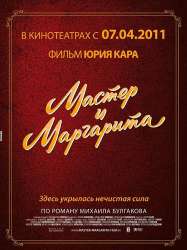
The Master and Margarita (1994)
, 2h5Directed by Iouri Viktorovitch Kara
Origin Russie
Genres Drama, Fantasy, Romance
Themes Films about writers
Actors Viktor Viktorovitch Rakov, Anastasia Vertinskaïa, Mikhaïl Oulianov, Nikolai Petrovich Burlyayev, Sergueï Garmach, Valentin Gaft
Roles Margarita
Rating64%





 , 1h55
, 1h55Directed by Vassili Pitchoul
Genres Comedy, Romance
Actors Natalia Negoda, Anastasia Vertinskaïa, Alexander Lenkov, Nadezhda Markina, Yuriy Nazarov
Roles Dunya Fomkina, Lena's mother
Rating66%





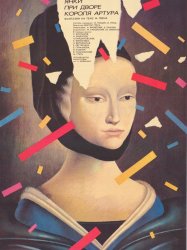
Genres Science fiction, Fantasy, Adventure
Themes Time travel films
Actors Albert Filozov, Alexandre Kaïdanovski, Anastasia Vertinskaïa, Yevgeniy Yevstigneyev
Roles Queen Morgana
Rating67%





A plane crashes in the time of King Arthur. The surviving pilot tries to accommodate to this strange new world.
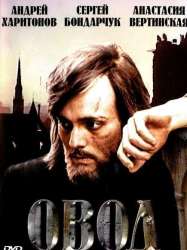
The Gadfly (1980)
, 3h30Genres Drama, Action, Historical, Romance
Actors Serge Bondartchouk, Anastasia Vertinskaïa, Andreï Kharitonov, Ada Rogovtseva, Konstantin Stepankov
Roles Джемма
Rating66%





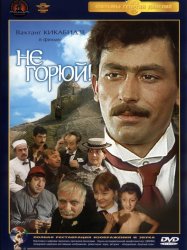
Don't Grieve! (1969)
, 1h34Directed by Gueorgui Danielia
Origin Russie
Genres Drama, Comedy, Romance
Actors Vakhtang Kikabidze, Sergo Zakariadze, Anastasia Vertinskaïa, Frounzik Mkrtchian, Sofiko Tchiaoureli, Dodo Abashidze
Roles Mary Tsintsadze
Rating77%





L'action se déroule en Géorgie tsariste. Le vieux médecin Levan Tsintsadze veut marier sa fille Mary avec son jeune collègue Benjamin Glonti. Mais Mary a un autre désir...
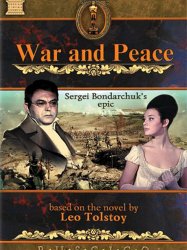
War and Peace (1968)
Directed by Serge Bondartchouk
Origin Russie
Genres Drama, War, Historical, Romance
Themes Political films, Histoire de France, Napoleonic Wars films, French Revolution films
Actors Serge Bondartchouk, Lioudmila Savelieva, Viatcheslav Tikhonov, Aleksandr Borisov, Oleg Tabakov, Nonna Mordioukova
Roles Lisa Bolkonskaya
Rating82%





Andrei Bolkonsky In St. Petersburg of 1805, Pierre Bezukhov, the illegitimate son of a rich nobleman, is introduced to high society. His friend, Prince Andrei Bolkonsky, joins the Imperial Russian Army as aide-de-camp of General Mikhail Kutuzov in the War of the Third Coalition against Napoleon. As Pierre's father recognizes him, he attracts the attention of Hélène Kuragin and marries her, only to discover she is unfaithful to him. Bolkonsky takes part in the failed campaign in Austria, where he witnesses the Battle of Schöngrabern and the Battle of Austerlitz. The prince is badly wounded and is mistaken for dead. His wife dies at childbirth. Bolkonsky returns to his home and meets Natasha Rostova, the young daughter of a count.

Anna Karenina (1967)
, 2h25Directed by Aleksandr Zarkhi
Genres Drama, Romance
Themes Films about sexuality, Films about suicide
Actors Tatiana Samoïlova, Nikolai Gritsenko, Vasily Lanovoy, Iya Savvina, Yury Yakovlev, Maïa Plissetskaïa
Roles Kitty
Rating69%





Anna Karénine, une jeune femme mariée de la haute société russe du XIX siècle, est amoureuse de Vronski, un jeune homme séducteur et fat. Elle prend la fuite avec lui, abandonnant ses enfants et son mari, ennuyeux et important. Les gens du monde se détournent d'Anna qui a de plus en plus de mal à retenir son amant. Elle finit par se jeter sous un train.
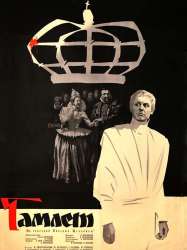
Hamlet (1964)
, 2h28Directed by Grigori Kozintsev
Origin Russie
Genres Drama
Themes Films about families, Théâtre, Political films, Films based on plays, Films based on works by William Shakespeare, Films about royalty
Actors Innokenti Smoktounovski, Anastasia Vertinskaïa, Grigori Kozintsev, Elza Radziņa
Roles Ophelia
Rating81%





La tragédie de William Shakespeare. Sur les remparts d'Elseneur, Hamlet voit apparaître le spectre de son père, ex roi du Danemark, qui lui révèle qu'il a été empoisonné pendant son sommeil par son frère Claudius avec la complicité de son épouse, la reine Gertrude. Le régicide lui a donc ravi sa femme, le trône et la vie. Afin de le venger, le jeune prince simule la folie et délaisse sa fiancée Ophélie. Au cours d'une explication avec sa mère, Hamlet croyant tuer l'usurpateur poignarde le chambellan Polonius. Sa fille, Ophélie devient folle et se suicide en se jetant dans une rivière. Laertes voulant venger son père provoque Hamlet en duel. Claudius pour être sûr de l'élimination de son neveu fournit une épée dont l'extrémité a trempé dans le poison au frère d'Ophélie. Au cours du combat les fleurets changent de main et Hamlet, bien que blessé, atteint Laertes, qui à l'agonie lui explique le plan machiavélique de son beau-père. Hamlet assassine Claudius tandis que sa mère meurt en buvant le breuvage empoisonné qui était réservé à son fils.
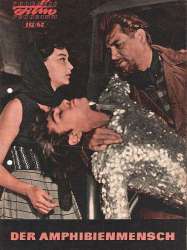
Amphibian Man (1961)
, 1h22Directed by Vladimir Chebotaryov
Genres Science fiction, Adventure, Romance
Actors Anastasia Vertinskaïa, Vladimir Korenev, Mikhaïl Kozakov
Roles Gutiere Baltazar
Rating68%





The story is set in a seaside port in Argentina (but filmed in Baku, Azerbaijan SSR), largely among a community of pearl fishers.
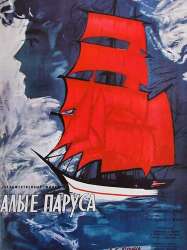
Scarlet Sails (1961)
, 1h28Directed by Alexandre Ptouchko
Origin Russie
Genres Drama, Fantasy, Melodrama, Romance
Actors Anastasia Vertinskaïa, Vasily Lanovoy, Ivan Pereverzev, Yevgeny Morgunov, Jemma Firsova, Oleg Anofriyev
Roles Assol
Rating69%





The setting is a small fishing village. The former seaman Longren (Ivan Pereverzev) raises his daughter Assol (Lena Cheremshanova/Anastasiya Vertinskaya) alone after losing his beloved wife, making a meager living by selling the toy boats he carves from wood. As a child, Assol encounters an old man (Nikolay Volkov) who claims to be a wizard and promises the girl that one day a prince will come on a ship with scarlet sails to carry her away. The villagers scoff but Assol believes her dream will come true one day.
 Connection
Connection
